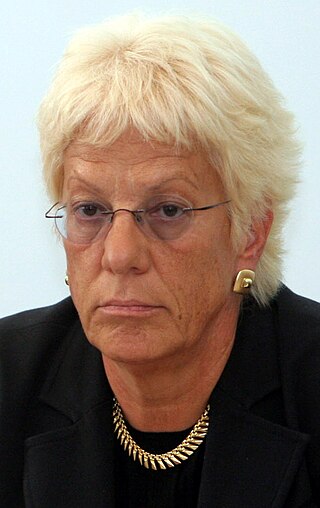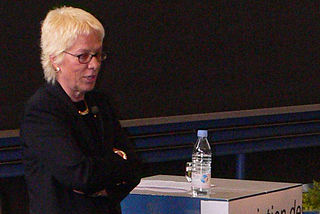
The International Criminal Tribunal for the former Yugoslavia (ICTY) was a body of the United Nations that was established to prosecute the war crimes that had been committed during the Yugoslav Wars and to try their perpetrators. The tribunal was an ad hoc court located in The Hague, Netherlands.

The International Criminal Tribunal for Rwanda was an international court established in November 1994 by the United Nations Security Council in Resolution 955 in order to adjudicate people charged for the Rwandan genocide and other serious violations of international law in Rwanda, or by Rwandan citizens in nearby states, between 1 January and 31 December 1994. The court eventually convicted 61 individuals and acquitted 14.

Carla Del Ponte is a Swiss former Chief Prosecutor of two United Nations international criminal law tribunals. A former Swiss attorney general, she was appointed prosecutor for the International Criminal Tribunal for the former Yugoslavia (ICTY) and the International Criminal Tribunal for Rwanda (ICTR) in August 1999, replacing Louise Arbour.

International criminal law (ICL) is a body of public international law designed to prohibit certain categories of conduct commonly viewed as serious atrocities and to make perpetrators of such conduct criminally accountable for their perpetration. The core crimes under international law are genocide, war crimes, crimes against humanity, and the crime of aggression.

Serge Brammertz is a Belgian prosecutor, academic and jurist. He serves as the chief prosecutor for the International Residual Mechanism for Criminal Tribunals (IRMCT) since 2016. He also served as the chief prosecutor for the International Criminal Tribunal for the former Yugoslavia (ICTY) from 2008 until its closure in 2017.

The Special Tribunal for Lebanon (STL), also referred to as the Lebanon Tribunal or the Hariri Tribunal, is a tribunal of international character applying Lebanese criminal law under the authority of the United Nations to carry out the investigation and prosecution of those responsible for 14 February 2005 assassination of Rafic Hariri, the former Lebanese prime minister, and the deaths of 21 others, as well as those responsible for connected attacks.
The United Nations International Independent Investigation Commission (UNIIIC) was established on 7 April 2005 by Security Council Resolution 1595 to investigate the assassination of former Prime Minister of Lebanon, Rafic Hariri, who had been killed in Beirut on 14 February 2005.

United Nations Security Council resolution 827, adopted unanimously on 25 May 1993, after reaffirming Resolution 713 (1991) and all subsequent resolutions on the topic of the former Yugoslavia, approved report S/25704 of Secretary-General Boutros Boutros-Ghali, with the Statute of the International Tribunal as an annex, establishing the International Criminal Tribunal for the former Yugoslavia (ICTY).

United Nations Security Council resolution 1047, adopted unanimously on 29 February 1996, after recalling resolutions 808 (1993), 827 (1993), 936 (1994) and 955 (1994), the Council appointed Louise Arbour as Prosecutor at the International Criminal Tribunal for Rwanda (ICTR) and the International Criminal Tribunal for the former Yugoslavia (ICTY).

United Nations Security Council resolution 1207, adopted on 17 November 1998, after recalling all resolutions concerning the conflicts in the former Yugoslavia, in particular Resolution 827 (1993), the Council condemned the Federal Republic of Yugoslavia for its failure to execute arrest warrants issued by the International Criminal Tribunal for the former Yugoslavia (ICTY).

United Nations Security Council resolution 1259, adopted unanimously on 11 August 1999, after recalling resolutions 808 (1993), 827 (1993), 936 (1994), 955 (1994) and 1047 (1996), the Council appointed Carla Del Ponte as Prosecutor at the International Criminal Tribunal for Rwanda (ICTR) and the International Criminal Tribunal for the former Yugoslavia (ICTY).

United Nations Security Council resolution 1503, adopted unanimously on 28 August 2003, after recalling resolutions 827 (1993), 955 (1994), 978 (1995), 1165 (1998), 1166 (1998), 1329 (2000), 1411 (2002), 1431 (2002) and 1481 (2003), the Council decided to split the prosecutorial duties of the International Criminal Tribunal for the former Yugoslavia (ICTY) and the International Criminal Tribunal for Rwanda (ICTR) which had previously been under the responsibility of one official, Carla Del Ponte, since 1999.

United Nations Security Council resolution 1504, adopted unanimously on 4 September 2003, after recalling Resolution 1503 (2003), the Council appointed Carla Del Ponte as Prosecutor at the International Criminal Tribunal for the former Yugoslavia (ICTY).

United Nations Security Council resolution 1505, adopted unanimously on 4 September 2003, after recalling Resolution 1503 (2003), the Council appointed Hassan Bubacar Jallow as Prosecutor at the International Criminal Tribunal for Rwanda (ICTR).

On 14 February 2005, former Prime Minister of Lebanon Rafic Hariri was assassinated along with 21 others in an explosion in Beirut, Lebanon. Explosives equivalent to around 1,000 kilograms of TNT were detonated as his motorcade drove near the St. George Hotel. Among the dead were several of Hariri's bodyguards and former Minister of Economy and Trade, Bassel Fleihan.

United Nations Security Council Resolution 2006 was unanimously adopted on 14 September 2011.

United Nations Security Council Resolution 1774 was unanimously adopted on 14 September 2007.

United Nations Security Council Resolution 1775 was adopted on 14 September 2007.

United Nations Security Council Resolution 1786 was unanimously adopted on 28 November 2007.
United Nations Security Council Resolution 1877 was unanimously adopted on 7 July 2009.
















